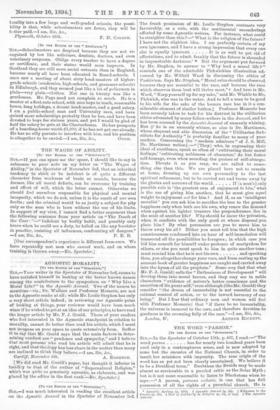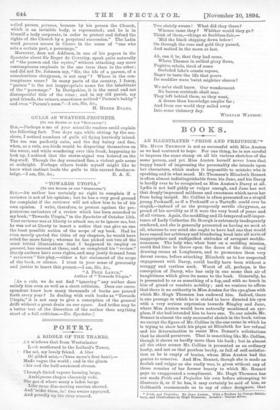THE WORD "PARSON."
[TO THE EDITOR OP THE "SpxoTsmon."] SIR,—In the Spectator of October 13th, p.497, I read :—" The word parson has for nearly two hundred years been used only in a contemptuous sense, and is now adopted by none but the enemies of the National Church, in order to insult her ministers with impunity. The true origin of the word has as yet not been clearly ascertained. We believe it to be a Druidical term." Doubtless the Druids may be made almost as serviceable to a puzzled critic as the Solar Myth ; but is it not more reasonable to listen to Blackstone when he says :—" A parson, persona eoclesia3, is one that has full possession of all the rights of a parochial church. He is Agnostic Apology (p. 368). t Arnstio Annual (p. 28). $ Witnesses to the 17neeen (p. 55). § Seat of Authority sn. Religion (P. 94, et BOO c) . II The Agnosti
Annual.
called parson, persona, because by his person the Church, which is an invisible body, is represented; and he is in himself a body corporate, in order to protect and defend the rights of the Church by a perpetual succession." The Latin word persona occurs in Cicero in the sense of "one who acts a certain part, a personage."
Moreover, does not Addison, in one of his papers in the Spectator about Sir Roger de Coverley, speak quite naturally of "the parson and the squire," without attaching any more contemptuous emphasis to the one term than to the other; and did not Dr. Johnson say, "Sir, the life of a parson, of a conscientious clergyman, is not easy " ? Where is the con- temptuous sense ? In many parts of the country, I fancy, " parson " is the not inappropriate name for the inhabitant of the "parsonage." In Derbyshire, it is the usual and not disrespectful title of the vicar; and in my old parish, my good friends, the miners, sometimes noticed" Parson's babby" and even "Parson's nuss."—I am, Sir, &c., H, HEBER EVANS.







































 Previous page
Previous page